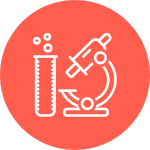Train to be a Genetic Counsellor through the Scientist Training Programme (STP).
This pathway through the STP will give you the skills and knowledge you need to become a qualified Genetic Counsellor. As a Genetic Counsellor you will work directly with patients and families offering genetic (genomic) information and support allowing them to make timely health decisions.
This three-year fully funded course combines academic learning at The University of Manchester with clinical training in NHS Trusts.
What is the role of an NHS genetic counsellor?
Genetic Counsellors provide genetic information to help people affected by a genetic condition.
This information and support may include:
- facilitating decision-making around the timing of genomic testing and screenings;
- supporting adjustments around a new genetic diagnosis;
- communication of genetic risk information.
For further information about the role please see the NHS Healthcare Careers website and the Association of Genetic Nurses and Counsellors website.
Why study MSc Clinical Science in Genomic Counselling?
From our students
Varied and interesting
"The genomic counselling modules are varied, interesting and though provoking. There is mix of lectures, workshops and seminars with ample opportunity to interact with other trainees and develop skills directly relating to practice ready for work-based rotations. The teaching team were engaging and passionate about their subject matter."
STP Genomic Counselling Trainee

A supportive environment
“All assessments are very well explained, with plenty of time to complete the work. I always feel supported and that they are designed with actual workplace activities in mind e.g. role play agenda setting (good practice for things we do).”
STP Genomic Counselling Trainee

Different perspectives
“I really love how our training is done with other trainee genomic counsellors. You get an insight into how things are done in their departments and different perspectives. My favourite thing about being in the group is the shared understanding you all have about what it means to be a genomic counsellor, the patients we see and what it means to work in this field.”
STP Genomic Counselling Trainee

Course description
Our MSc in Clinical Science (Genomic Sciences) prepares you for a Clinical Scientist role in the NHS
You’ll gain the skills to:
- explain complex genomic information to patients and their families;
- select clinical testing strategies as appropriate;
- be key participates in multi-disciplinary planned care.
The MSc Genomic Sciences (Genomic Counselling) is accredited by the National School for Healthcare Sciences. It consists of 120 credits of taught units and a 60-credit research project.
Course units
| Year | Title | Credit Rating | Mandatory/Optional |
|---|---|---|---|
| 1 | Professional Foundations of Healthcare and Clinical Science | 20 | Mandatory |
| 1 | Introduction to Genetics Genomics and Molecular Science | 10 | Mandatory |
| 1 | Introduction to the Principles and Practice of Genetic and Genomic Counselling | 10 | Mandatory |
| 1 | Introduction to Clinical Bioinformatics | 10 | Mandatory |
| 1 | Introduction to Genomics in Mainstream Healthcare and Social Care | 10 | Mandatory |
| 2 | Research Skills in Healthcare Science | 10 | Mandatory |
| 2 | Applied Genetics and Genomics in Clinical Care | 10 | Mandatory |
| 2 | Counselling and Communication Skills for Genetic Counsellors | 10 | Mandatory |
| 3 | Advanced Genomic Counselling and Ethical Practice | 15 | Mandatory |
| 3 | Applied Genomics and Bioinformatics in Advanced Clinical Care | 15 | Mandatory |
| 2/3 | Research Project in Genomic Counselling | 60 | Mandatory |
Entry Requirements
To apply to the Scientist Training Programme (STP) you must have either:
- A First or Upper Second class honours degree in either an undergraduate honours degree or an integrated master’s degree. Both options must be in a pure or applied science subject relevant to the specialty for which you are applying
- Or a higher degree (a degree completed after a bachelors degree, at a more advanced level such as MSc) in a relevant subject for the specialty being applied to and a Lower Second class honours degree in any subject.
- For the Genomic Counselling Pathway, previous experience working in a caring role is highly desirable.
How to apply
Apply for the programme through the National School for Healthcare Science website.
Application to the course takes place annually through a highly competitive national process. Please see the National School for Healthcare Science website for full application details.





